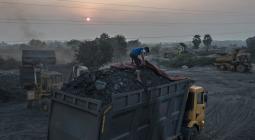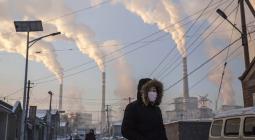A toxic crisis in America’s coal country
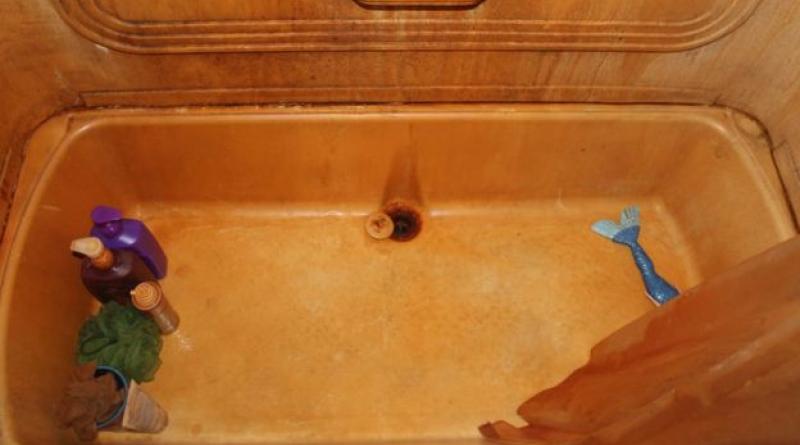
In the shadow of some of America's most controversial coal mines, where companies use huge amounts of explosives to blow the tops off mountains, isolated communities say their water has been poisoned.
Now, they must decide if they will fight back against an industry they have relied upon for generations.
Casey (not her real name) wears a one-dollar wedding ring now. She bought the blue plastic band after her original ring was ruined by the toxic water that has been pumping into her home for more than a decade.
"I just needed something there," she says, as she holds the replacement ring up to the light. "I felt empty without it." She places her original wedding band, now discoloured and corroded, in her palm. Her skin, especially on her hands, has become coarse and sore.
The taps in her house have been worn down, her washing machine frequently stops working, and her bathroom and kitchen have been stained a deep, bloody orange by the pollutants - iron, sulphur, even arsenic - that have seeped into her home's water supply.
This is Appalachia - the heart of America's coal country. It is home to some of the poorest and most isolated communities in the US and the legacy of mining, be it the abandoned processing plants or the scarred landscape, can be seen dotted alongside its vast highways.
Casey's home is a small, double-berth structure with a wooden porch in southern West Virginia, in a place with very patchy mobile phone reception.
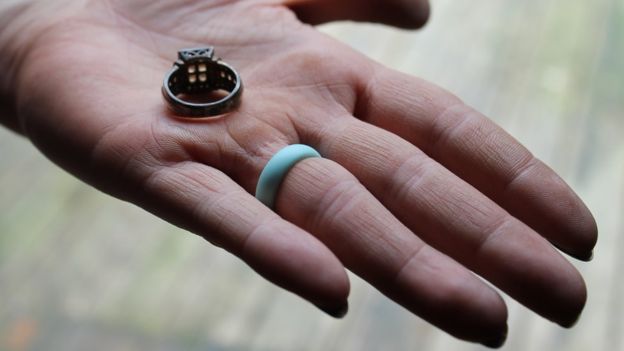
She pours a glass of water from her kitchen tap and lets it rest on a table. It has a strange smell and a sticky texture and within minutes begins to turn dark orange. A layer of black sediment soon sinks to the bottom of the glass.
"This is what we have to live with," Casey says. "We don't bathe in the water and we don't cook with it. It stains our fingernails, our knuckles, and our clothes. It's really, really difficult living like this."
Casey and her husband Jack (not his real name), have two young children and drive for more than an hour to stock up on bottled water to drink and cook with. So who do they hold responsible?
"I've been here all my life, but when the surface [coal] mine came in that's when the water started changing," says Jack, who, despite being a miner himself, believes the industry is accountable for his family's water problems.
"I think if they've done wrong they should have to fix it."
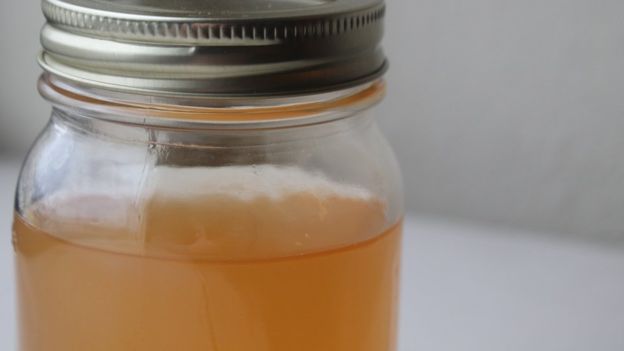
At the sprawling mine in the neighbouring valley, millions of pounds of explosives are being detonated on the mountaintops so that coal, buried deep below the surface, can be excavated.
This process is a type of surface mining known as mountaintop removal, and has drawn the ire not only of nearby residents but environmental groups who say it devastates the landscape and pollutes the waterways.
One study estimates that an area the size of the state of Delaware has been flattened by this type of coal mining, which was first practised in the 1970s.
Another report by the Environmental Protection Agency (EPA) estimates that more than 2,000 miles of streams - a distance longer than the Mississippi river - have been buried by the excess rock and soil (known as overburden) that is dumped after the explosions.
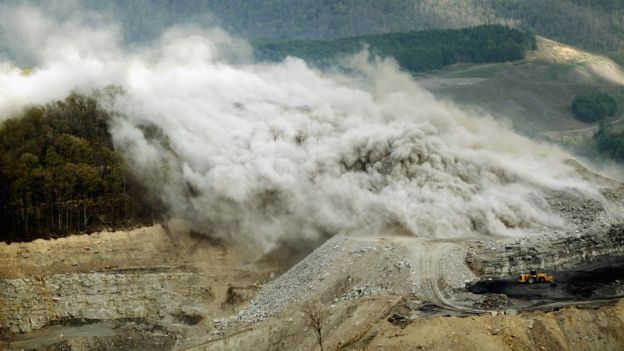
And in a part of the world where many people rely on their own wells to get water, rather than a conventional pipeline, any pollution from mining waste can have devastating consequences.
These private wells are essentially unregulated, so it is up to people like Casey and Jack to determine whether their water has been contaminated. But the complex nature of water pollution means many people are completely unaware of what's coming out of their taps.
"When you dump a lot of overburden into the valley, and start covering up streams, you have water sources that end up travelling through the [waste] material,' says Professor Michael McCawley, an environmental engineer who has spent time researching the health impacts of mountaintop removal.
"It's kind of like dumping geological trash," he explains. "It ends up increasing the concentration of acidic ions and metals [in the water], things like arsenic and nickel."
This pollution, according to his research, has taken a major toll on the health of those whose water supply lies in its path.
"This population is under assault from both water and air," Professor McCawley says. "What we're finding in the water is likely to cause inflammation in the body, which can set off a lot of other chronic diseases.
"The big [problems] we have found are certainly cancers. Name a cancer and they're seeing it here."
When asked about cancer rates, Casey reels off a list of people living nearby who have been recently diagnosed. "Oh Lord everybody has been getting it," she says. "It's scary."
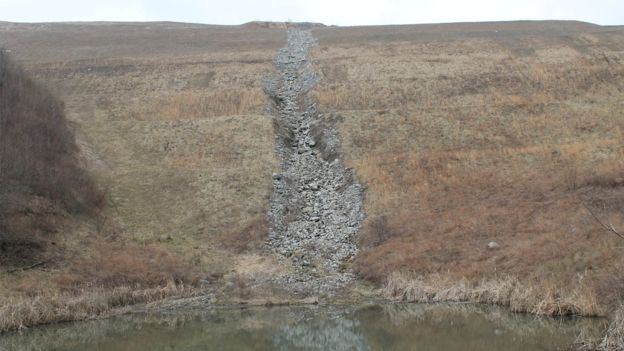
Dr Wesley Lafferty, who is based in nearby Boone County, believes a number of health problems are being exacerbated by mining waste.
"We get all kinds of symptoms," he told Human Rights Watch last year. "Rashes, restrictive airway disease, dermatitis, generic skin disease.
"I definitely feel there is an environmental component to that."
In a valley not far from the home of Casey and Jack, and sitting within earshot of the same mine they say has caused their water contamination, Jason Walker is describing many of the same problems.
"My water was drinkable and clear before the mountaintop removal started," he says. "But then it got worse. It smelt like rotten eggs and the colour of my sinks, faucets [taps], all my laundry, turned orange."
He then had his water tested and was warned that it was so toxic that, if he washed his clothes in it, there was a risk that direct sunlight could actually set them on fire.
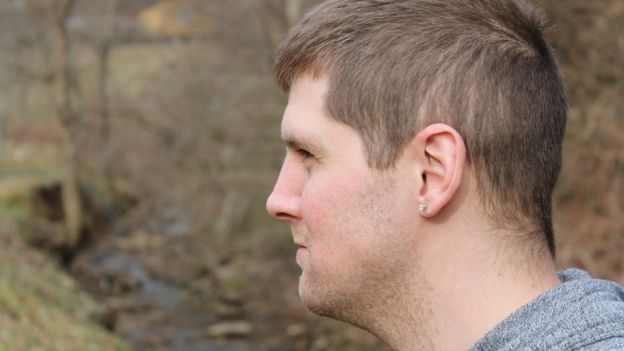
Jason now cooks with bottled water, but he has been collecting water from a nearby stream and treating it with swimming pool chemicals to supply his house.
Last winter, after a spell of severe cold weather, he used an axe to cut through more than five inches (12.7cm) of ice to access the stream water. But when the pipes he was using to collect it froze over he had to go without.
"I'm getting a new well drilled for $4,000 [£3,088] to keep myself from doing that again, even though I don't know how good the water will be," he says. "I took a loan out against our property to pay for it. It's a huge gamble.
"My grandfather was a coal miner, my dad was a coal miner, but if the mines tear something up I think they should replace it.
"I want more regulations that actually help the little person and not the big person."
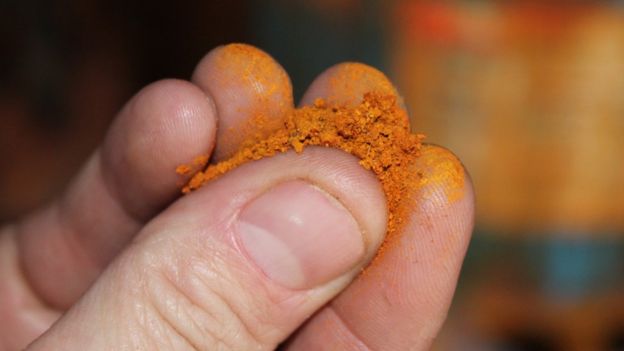
In a telephone interview with the BBC, a spokesman for the company that owns the surface mine in Wyoming County said that it operated under state regulations and with a valid permit.
"We view ourselves as pretty good neighbours and if somebody has an issue then we would address it," said the spokesman for CM Energy, which took over the mine in 2017.
When presented with the complaints of nearby residents, the spokesman declined to take responsibility and said the water contamination could have been caused by a number of different issues.
"If we thought we were responsible then we would step up and try and do something about it," the spokesman said. "If there's something that our company can do to facilitate working with politicians and the local community then we would participate."
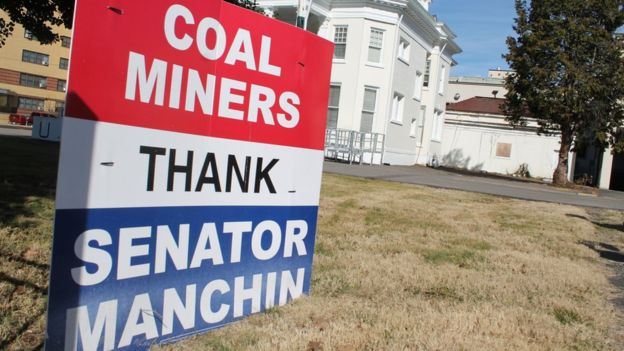
The mine's previous owner, Dynamic Energy, did not respond to a request for comment.
That company is facing a lawsuit from a number of residents - including Casey and Jack - who are seeking compensation for the costs of dealing with their water issues.
It won a similar lawsuit a few years ago, and Jason, who was part of that legal battle, said it left the entire community divided between those who supported the coal industry and those who wanted to fight back.
"There's a lady down the street here who wouldn't join the lawsuit," he says. "She hasn't spoken to me in almost two years because of it. They were scared it would mean losing jobs."
Casey understands their concerns. "It's how people make their living and support their families," she says. "If you don't work in the coal mines you either flip burgers or you have to move out of state and do something else."
But her husband Jack says it wasn't a difficult decision to join the latest legal action - even if he is a coal miner.
"The only thing I really care about is getting fresh water the way it was when I was growing up around here," he says. "I ain't worried about the money. I just want clean water."
11 February 2019


